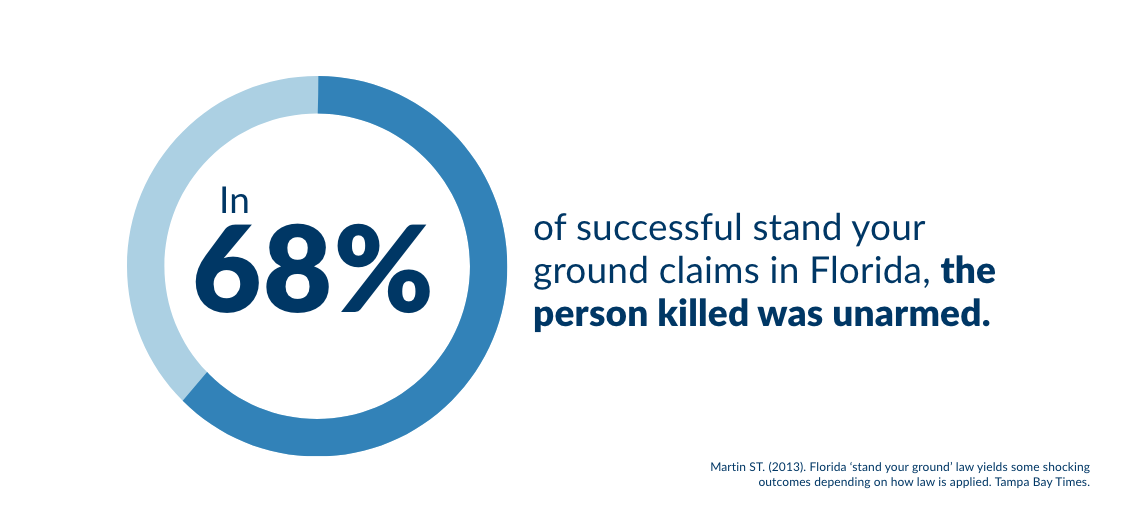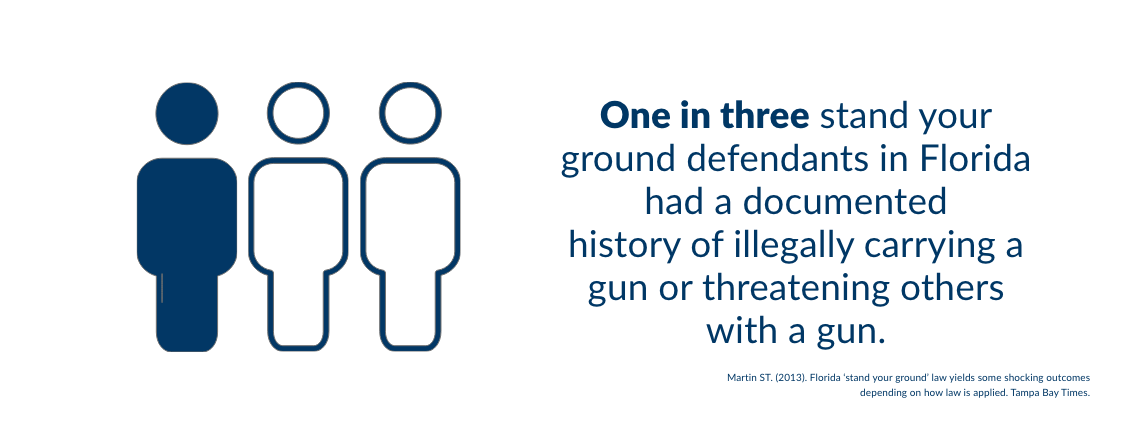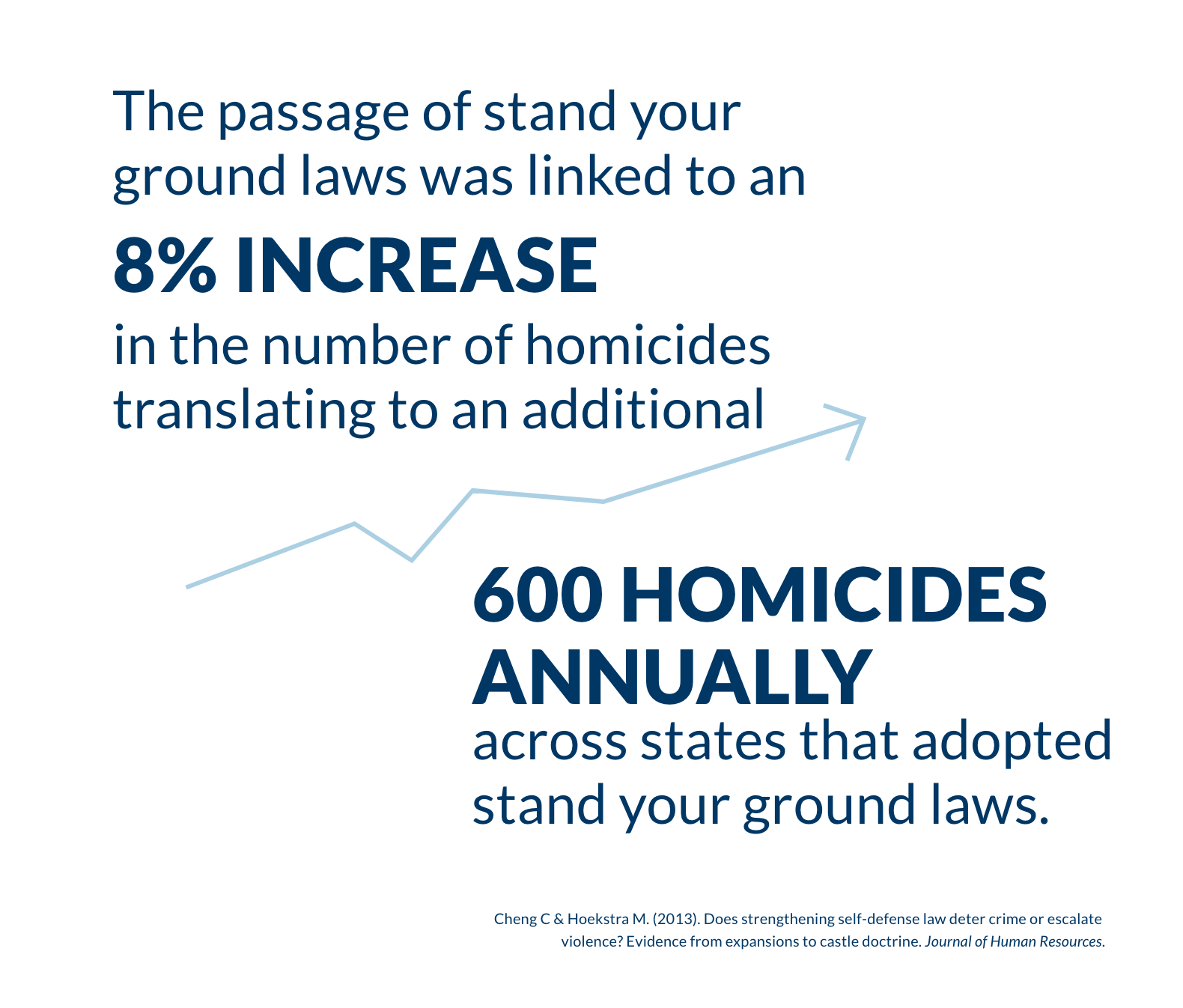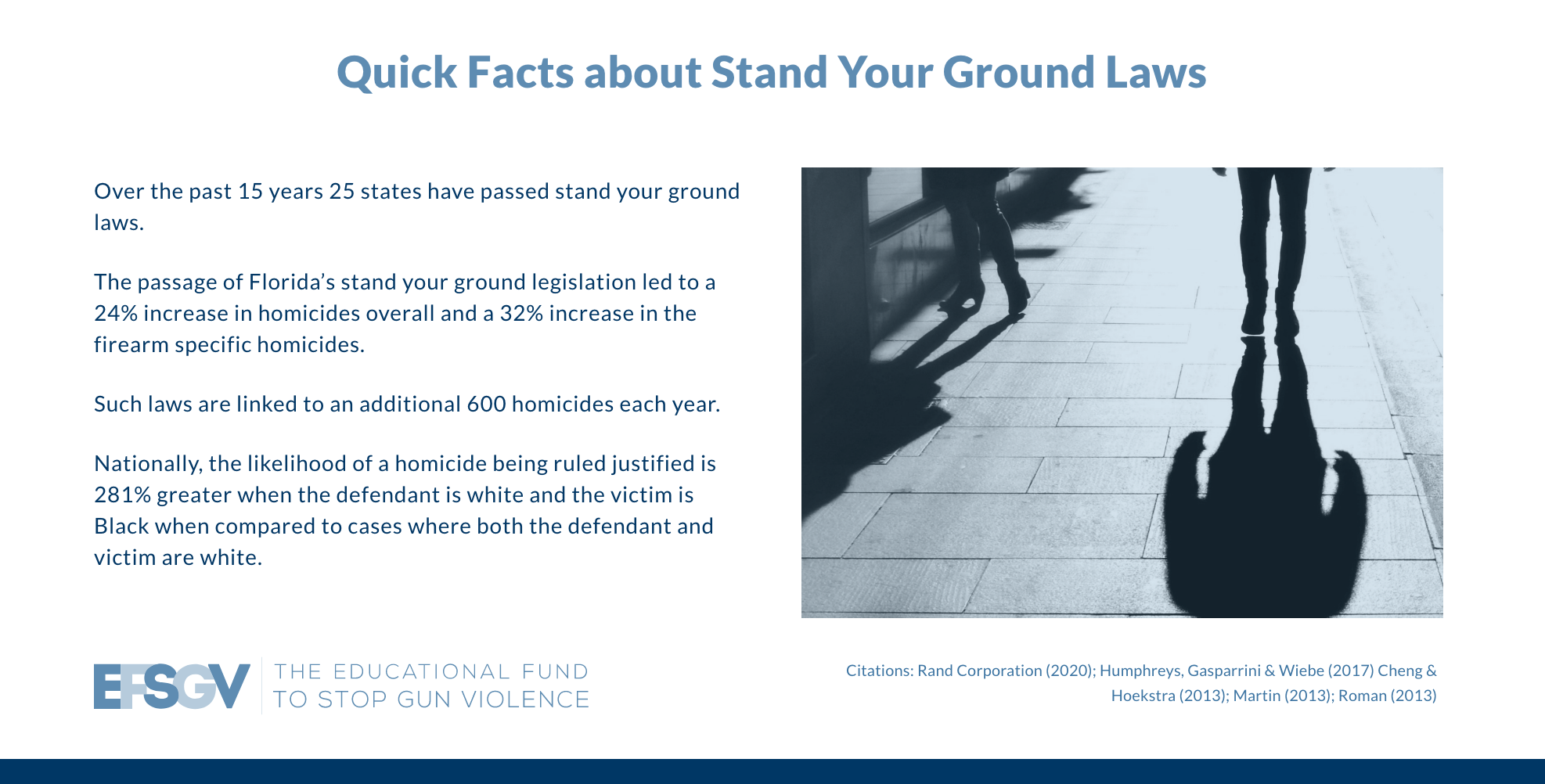Stand Your Ground Laws
Background
For hundreds of years, states strictly limited the right to use deadly force in self-defense, based on the principle that if you could spare human life, it was incumbent upon you to do so.7,8 Before 2005, laws in nearly every state required that individuals outside of their home had a duty to retreat before resorting to the use of deadly force.9 Only if individuals were unable to flee from a dangerous situation and faced with imminent death or great bodily harm could they be justified in using deadly force. This legal doctrine is known as the duty to retreat.10
Duty to retreat: Legal principle that requires a person to flee or back away from a threatening situation when they can safely do so rather than attempt self-defense by deadly force.
In 2005, the Florida state legislature passed a stand your ground law, upending centuries of this duty to retreat legal doctrine.11 Over the next 15 years, states across the country adopted measures similar to Florida’s. As of September 2021, 29 states have stand your ground laws, and an additional eight states have statutes that expand the right to stand your ground beyond the home, such as to one’s car or workplace.12
- Stand Your Ground Laws
- No Stand Your Ground Laws
WHAT DO STAND YOUR GROUND LAWS DO?
Stand your ground laws allow individuals to avoid criminal prosecution for the use of deadly force, among other things, even when these individuals could easily and safely retreat.13 Many of these laws also allow individuals to use deadly force to prevent the commission of certain felonies, such as robbery, even when the defendant does not have a reasonable fear of death or serious injury.14,15
Some statutes, like Florida’s, contain criminal immunity provisions making it even more difficult to arrest and charge the stand your ground defendant. Criminal immunity can hinder law enforcement from making an arrest unless they have probable cause to support the belief that the use of force was unlawful. Rather than requiring that the defendant prove they acted in self-defense, these immunities shift the burden of proof to the state.16 Police and prosecutors must prove that the defendant did not act in self-defense.17
In many states, stand your ground laws provide additional civil immunities, which prevent victims and bystanders harmed from bringing lawsuits against the stand your ground defendant.18,19
Stand your ground laws embolden armed vigilantism, and their unequal application is emblematic of the type of structural racism embedded within our criminal justice system.
Trayvon Martin, Florida, 2012
Seventeen-year old Trayvon Martin was walking back to his relative’s house after buying candy at a convenience store. George Zimmerman, a neighborhood watch coordinator, reported what he said was a “real suspicious Black guy” to 911. Zimmerman was told by the 911 operator not to chase after Martin. But Zimmerman got out of his car and pursued Martin, who was unarmed, and after a physical altercation shot Martin dead. When the police arrived, Zimmerman claimed self-defense and was not arrested. As the police chief later explained, “[i]n this case Mr. Zimmerman has made the statement of self-defense . . . Until we can establish probable cause to dispute that, we don’t have the grounds to arrest him.”20 Zimmerman was later tried and acquitted. Florida’s stand your ground law contributed to Zimmerman’s acquittal.21,22
WHY ARE STAND YOUR GROUND LAWS DANGEROUS?
Stand your ground laws create a dangerous “shoot first” culture of violence and vigilantism. They have repeatedly allowed people to shoot and kill others even when it is clear that they could have easily and safely walked away.
One study of cases in which stand your ground was used as a defense in Florida from 2005 through 2012 found that in 79% of the cases where such claims succeeded, the defendant could have retreated to avoid the confrontation, and in 68% of successful claims, the person killed was unarmed.23

Stand your ground laws may also embolden individuals, often with a history of violence, to escalate conflicts and kill. States have deemed justified killings of victims who were facing away, retreating or even lying on the ground when they were shot.25 These laws allow individuals to provoke a fight and then kill the person they provoked. For example, in nearly a third of Florida’s stand your ground self-defense claims, the defendant initiated the conflict. Research to date from Florida suggests those using stand your ground as a defense often have histories of violence. In fact, one in three stand your ground defendants in Florida had a documented history of illegally carrying a gun or threatening others with a gun.26

Miguel Antonio DeJesus and Diego Ortiz, TX, 2007
Two months after Texas’s stand your ground law took effect, a 61-year-old white man called law enforcement to report a burglary in his neighbors’ house by what he said were two Black men. Despite being instructed by law enforcement to stay in his home and wait until they arrived, the man approached the suspects, and proceeded to shoot them in the back as they fled, killing them both. Prior to Texas’s stand your ground law, this man would have very likely been convicted of murder. Texas’s stand your ground law allowed this killer to walk free without a conviction for any crime at all.28
STAND YOUR GROUND LAWS INCREASE HOMICIDE AND GUN INJURIES
National Impacts of Stand Your Ground Laws
Evidence does not support the claim often made by stand your ground proponents, that the measure deters criminal activity and violence. In fact, a number of studies examining homicide and violent crime rates consistently show that the passage of stand your ground laws increase homicides and gun injuries. One study analyzed ten years (2000-2010) of FBI data in 21 states that passed stand your ground laws during the study period. The authors found that there was no evidence that these laws reduce burglary, robbery, or aggravated assault. On the contrary, this study found that the passage of stand your ground laws was linked to an 8% increase in the number of homicides, translating to an additional 600 homicides annually across states that adopted stand your ground laws.29

A subsequent paper that examined vital statistics reported by the CDC found a similar increase of 7.5% in the overall firearm homicide rate as a result of stand your ground laws. This study also found that stand your ground laws increase emergency room visits for nonfatal firearm injuries using data from State Emergency Department Databases.31 Stand your ground laws were linked to the largest increases in homicides among white male victims when compared to other demographic groups. This is likely because white men make up the majority of concealed carry permit holders and are thus most likely to become emboldened to use their gun in states with stand your ground laws.
Because the vast majority of gun homicides occur between victims and perpetrators of the same race, stand your ground laws are linked to large increases in the number of white shooters and white homicide victims.32 However, there are stark racial inequities in the application of stand your ground laws as a defense that disproportionately impact Black Americans.
Impacts of Florida’s Stand Your Ground Law
Research focused specifically on Florida found that the state’s stand your ground law is linked to large increases in homicides. One study that examined Florida’s homicide rate from 1999 to 2014 found that the passage of stand your ground legislation in 2005 was linked to a 24% increase in the overall homicide rate and a 32% increase in the firearm specific homicide rate.33 A later study of unlawful homicides (excluding justifiable homicides) found that Florida’s stand your ground law increased unlawful homicides by 22%.34 Researchers also examined the impact of Florida’s stand your ground laws on adolescent homicide and found it associated with a 45% increase in adolescent (ages 15-19) firearm homicide.35
STAND YOUR GROUND LAWS EXACERBATE EXISTING RACIAL DISPARITIES
Stand your ground laws contribute to the killing of Black individuals with impunity. These laws give a green light to people with no bias training, no firearms training, and no de-escalation training to use deadly force within a matter of seconds. The degree of danger is determined and filtered through the preconceived notions, prejudice, and racism of untrained citizens.
A study of Florida’s stand your ground law found that it exacerbates racial disparities in gun homicides within the state. The authors found that before Florida’s stand your ground law took effect, Black adolescents ages 15-19 were twice as likely to be shot and killed as their white counterparts. After the law was passed the likelihood of a Black adolescent being shot and killed was three times higher than white adolescents.36
STAND YOUR GROUND LAWS ARE NOT EQUITABLY APPLIED AS A DEFENSE
Stand your ground laws are not equitably applied as a defense. White men are more likely to successfully invoke the use of stand your ground laws for their defense after a shooting than women – especially Black women – or Black men.
In a paper published by the Urban Institute, authors examined FBI homicide data from 2005-2010 and found large disparities in homicides being ruled justified based on the race of the defendant and the victim.
Nationally, the likelihood of a homicide being ruled justified is 281% greater when the defendant is white and the victim is Black when compared to cases where both the defendant and victim are white. In contrast, the likelihood of a homicide being ruled justified when the defendant is Black and the victim is white is 49% lower compared to cases where both the defendant and victim are white.37
Homicides Ruled Justified, 2005-2010
Percent Ruled Justified
Race of Perpetrator and Victim
The author of the Urban Institute paper found that these national disparities were exacerbated by stand your ground laws. States with stand your ground laws are linked to a 65% increase in the odds of a homicide being ruled justified, driven primarily by cases where the defendant is white.
When a white person shoots a Black person in a stand your ground state, the odds that the homicide will be ruled justified increase by seven percentage points. Likewise, the odds of a homicide being ruled justified in a stand your ground state also increase when a White person shoots another white person.
Stand your ground states do not, however, lead to the same increases in justifiable homicides when the defendant is Black. When a Black person shoots a white person, the odds the homicide will be ruled justifiable are virtually the same whether the shooting took place in a stand your ground state or a state without a stand your ground law. When a Black person shoots another Black person in a stand your ground state, the likelihood the homicide will be ruled justified increases by only one percentage point. This highlights that for a Black defendant claiming self-defense, stand your ground laws do not increase the chance of the homicide being ruled justified.
A different study of stand your ground cases in Florida from 2005-2013 also found that the law is not applied equitably based on the race of the victim. The authors of this Florida study found that in self-defense cases with similar circumstances, when the victim is white the defendant is twice as likely to be convicted when compared to cases where the victim is non-white.
Both the national and Florida-specific studies highlight that stand your ground laws are not equitably enforced. Instead, they exacerbate already existing disparities embedded within the criminal justice system. These laws almost exclusively serve white Americans, providing protections and immunity to white Americans who claim self-defense, while not affording the same protections to Black Americans.
Ahmaud Arbery, Georgia, 2020
In Georgia, Ahmaud Arbery’s young life ended abruptly when two armed white men shot Arbery, who was Black, in broad daylight while he was on a jog. His murderers justified the killing by invoking Georgia’s stand your ground law, and no investigation or arrest was made until months later. Arbery’s senseless killing is the most recent example of how stand your ground laws have been used to escalate gun violence, privilege vigilantism over the value of human lives, and justify the unjustifiable killing of unarmed young Black men.
Stand Your Ground Laws Favor Abusers And Fail Survivors of Domestic Violence
Stand your ground laws are not designed to protect survivors of domestic violence. Gun rights groups including the NRA continue to push for stand your ground laws under the pretense that they empower women. This is far from the truth. Instead, many scholars note that stand your ground laws reinforce existing gender disparities in self-defense laws by expanding the protections for White men and fostering a toxic and violent form of masculinity. They create a culture that normalizes and praises male violence against strangers.43 This toxic culture extends into the home and can embolden domestic abusers and reinforce the unequal power dynamics that allow white men to act violently towards women with a feeling of impunity.44
Conversely, stand your ground laws are rarely successfully invoked by women defending themselves in domestic abuse situations; this is especially true for women of color. Most violence against women is perpetrated by a known acquaintance or partner and occurs in the home.45 Stand your ground laws do not apply to violence that occurs in the home between two people who live together. Likewise, the self-defense statutes that apply to domestic violence situations in the home make it hard for victims of domestic abuse to successfully claim self-defense.46 Under stand your ground, often women who can prove that they have been repeatedly attacked by their partner are not afforded the same self-defense protections as someone (usually a white man) who shoots a stranger in public and claims self-defense. This is especially true for Black women who face both the gender and racial discrimination that is rooted in the criminal justice system. The actions of Black women to defend themselves are viewed through a racialized and gendered lens, and are thus more likely to be viewed as aggressive. Consequently, while white men who escalate conflicts benefit from stand your ground laws, Black women defending themselves from domestic violence do not.47
Brittany Smith, Alabama, 2018
Brittany Smith was charged with murder for shooting and killing a man who just hours earlier had raped, strangled, and assaulted her, leaving Brittany with more than 30 injuries. Brittany’s brother attempted to intervene to prevent the perpetrator from attacking Brittany again. At the time of the shooting, the perpetrator was choking Brittany’s brother. Brittany claimed self-defense under Alabama’s stand your ground law and was denied immunity. She was subsequently changed with murder.48 The example of Brittany Smith highlights how stand your ground laws were written to benefit men, not survivors of domestic violence.
Recommendations
Repeal state-level stand your ground laws, which run counter to centuries of self-defense doctrine and make it legal for individuals to kill another even when they can easily and safely retreat.
Stand your ground laws create a dangerous “shoot first, ask later” culture of violence, and are linked to increases in homicides and nonfatal injuries. Stand your ground laws also exacerbate racial and gender disparities embedded within our criminal justice system. white men are more likely to successfully invoke the use of stand your ground laws for their defense after a shooting than Black Americans or women. States with existing stand your ground laws should repeal these laws. States without stand your ground laws should not enact these laws.
RESOURCES
EDUCATIONAL MATERIALS
FACT SHEETS
REPORTS
READ MORE
- Chavis K. (2020) Column: If we truly value Black lives, end stand-your-ground. The Columbus Dispatch.
- Examining the race effects of stand your ground laws and related issues. (2020). U.S. Commision on Civil Rights.
- The effects of stand-your-ground laws. (2020). Rand Corporation.
- National Task Force on Stand Your Ground Laws. (2015). American Bar Association.
- Martin ST. (2013). Florida 'stand your ground' law yields some shocking outcomes depending on how law is applied. Tampa Bay Times
RESEARCH
- Cheng C & Hoekstra M. (2013). Does strengthening self-defense law deter crime or escalate violence? Evidence from expansions to castle doctrine. Journal of Human Resources.
- Degli Esposti M, Wiebe DJ, Gravel J, & Humphreys DK. (2019). Increasing adolescent firearm homicides and racial disparities following Florida's 'Stand Your Ground' self-defence law. Injury Prevention.
- Franks MA. (2013). Real men advance, real women retreat: Stand your ground, battered women's syndrome, and violence as male privilege. U. Miami L. Rev.
- Humphreys DK, Gasparrini A, & Wiebe DJ. (2017). Association between enactment of a “Stand Your Ground” self-defense law and unlawful homicides in Florida. JAMA Internal Medicine.
- Humphreys DK, Gasparrini A, & Wiebe DJ. (2017). Evaluating the impact of Florida's "Stand Your Ground" self-defense law on homicide and suicide by firearm: An interrupted time series study. JAMA Internal Medicine.
- Lave TR. (2012). Shoot to kill: A critical look at stand your ground laws. U. Miami L. Rev.
- McClellan C & Tekin E. (2017). Stand your ground laws, homicides, and injuries. Journal of Human Resources.
- Roman JK. (2013). Race, justifiable homicide, and stand your ground laws: Analysis of FBI supplementary homicide report data. Urban Institute.
Last updated September 2021

